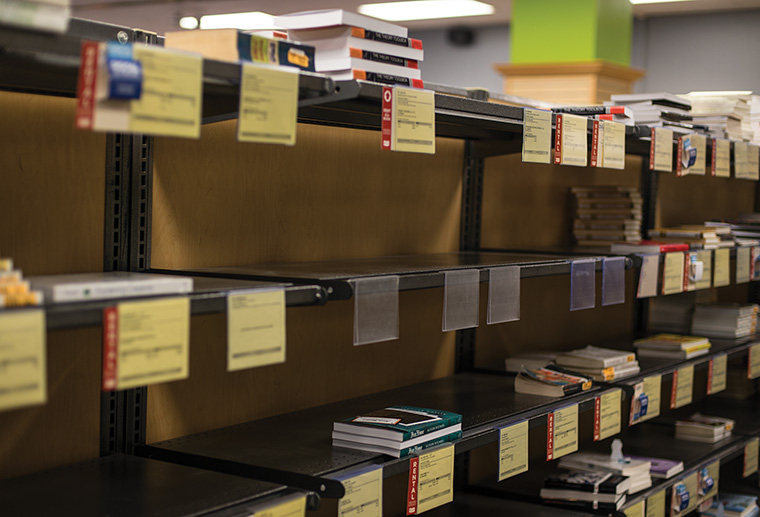Students suffer without books first weeks of class
February 17, 2014

Columbia’s bookstore, 624 S. Michigan Ave., had unusually bare shelves this semester. According to Ann Marie Pausha, the bookstore’s manager, the shortage was due to late book requests from the faculty.
The unusually bare shelves of Columbia’s bookstore, which left some students without textbooks for the first few weeks of the spring semester, could be the result of faculty members submitting late requests.
Faculty members are supposed to fill out an adoption form that lists the course name, course number and name of any required textbooks students may need for the semester. These should be submitted to the bookstore, 624 S. Michigan Ave., by Oct. 15 for the spring semester and April 15 for the summer and fall semesters, said Ann Marie Pausha, manager of the bookstore. She said many forms were turned in after the deadline, which contributed to the store’s book shortage and that there were more late requests than usual.
“We’re only as good as the information we get from the professors and the teachers,” Pausha said. “If they give us wrong information or if they change the title midway through or give us orders two days before classes start, we’re not going to have books right away.”
Jennie Fauls, assistant director of the First-Year Writing program in the English Department, said it is her responsibility to complete adoption forms for all the faculty members in the First-Year Writing program. She said that some of those requests were late for the spring semester. However, she said she depends on professors in the department to get their requests to her on time.
“We tend to be a little late and I take responsibility for that,” Fauls said. “If they are late, there’s a legitimate reason. Sometimes, faculty gets switched around if enrollment creates schedule changes, and sometimes faculty members are reassigned.”
Fauls said she teaches Introduction to College Writing, Writing & Rhetoric I and II, and on average requires her students to obtain one book per class. She said the feedback she received from her students did not express any difficulties obtaining books from the bookstore. In fact, Fauls said her students had more options than usual.
Fauls said despite the late submission of adoption forms, the English Department and bookstore have a strong partnership.
Pausha said approximately 1,400 books are ordered per semester based on past sales and the current enrollment numbers. She said the bookstore usually orders the necessary number of books.
Pausha said the bookstore offers students alternative options for getting a textbook when the store does not have it in stock. She said the bookstore has a program called Save the Sale that allows students to place a prepaid order. It can take up to a week to restock books and some book shipments were also delayed because of the severe winter weather, she added.
Pausha said the bookstore is working to restock as quickly as possible.
“We work really hard with the students and the professors,” Pausha said. “We have no problem trying to go above and beyond and letting you know why something might be here or might not be here.”
Despite the bookstore working with students to get them textbooks as quickly as possible, some students are still missing books they need to complete class assignments.
Zach Kornhauser, a sophomore double-majoring in music and audio arts & acoustics, said he had difficulty purchasing his books. He said this is the third time since he started at Columbia that the bookstore did not have a book he needed.
“The customer support and the service has been pretty bad,” Kornhauser said. “There was a book that I needed and they didn’t have it. They must have taken too long or just have procrastinated with it because I had to wait a week or so to actually get it.”
Roland Hansen, head of Access Services & Space at Columbia’s library, said the library keeps at least one copy of all required class texts that cost more than $40 on reserve and said he encourages students to use them when they are bookless.
“A couple of years ago, we put in a policy that we would automatically put textbooks on reserve,” Hansen said. “It used to be that we would wait for faculty to request their items, but it got really cumbersome and this was an easy way to make sure we had the more costly items ready to go on the first day of term.”
Hansen said he noticed an influx of students requesting books on reserve this semester. Because the library works directly with the bookstore, Hansen said he knows many of the adoption forms came in late, which contributed to the shortage of books.
Hansen said students should use reserved books on the weekends when demand is low and photocopy or scan the pages they need.
“To be honest, many people come at the last minute,” Hansen said. “People often come a couple hours before the class or the test and then there’s a lot of people who want the item.”
Although the bookstore and library give students options, the lack of inventory causes some students to purchase books elsewhere, where the college makes no profit from it.
Madeleine Thiers, a sophomore fashion studies major, said when the bookstore does not have a book she needs, she orders it from online sources.
“I’ve never taken advantage of [reserve books],” Thiers said. “I usually prefer getting it from either Amazon or any other place if the bookstore didn’t have it.”







